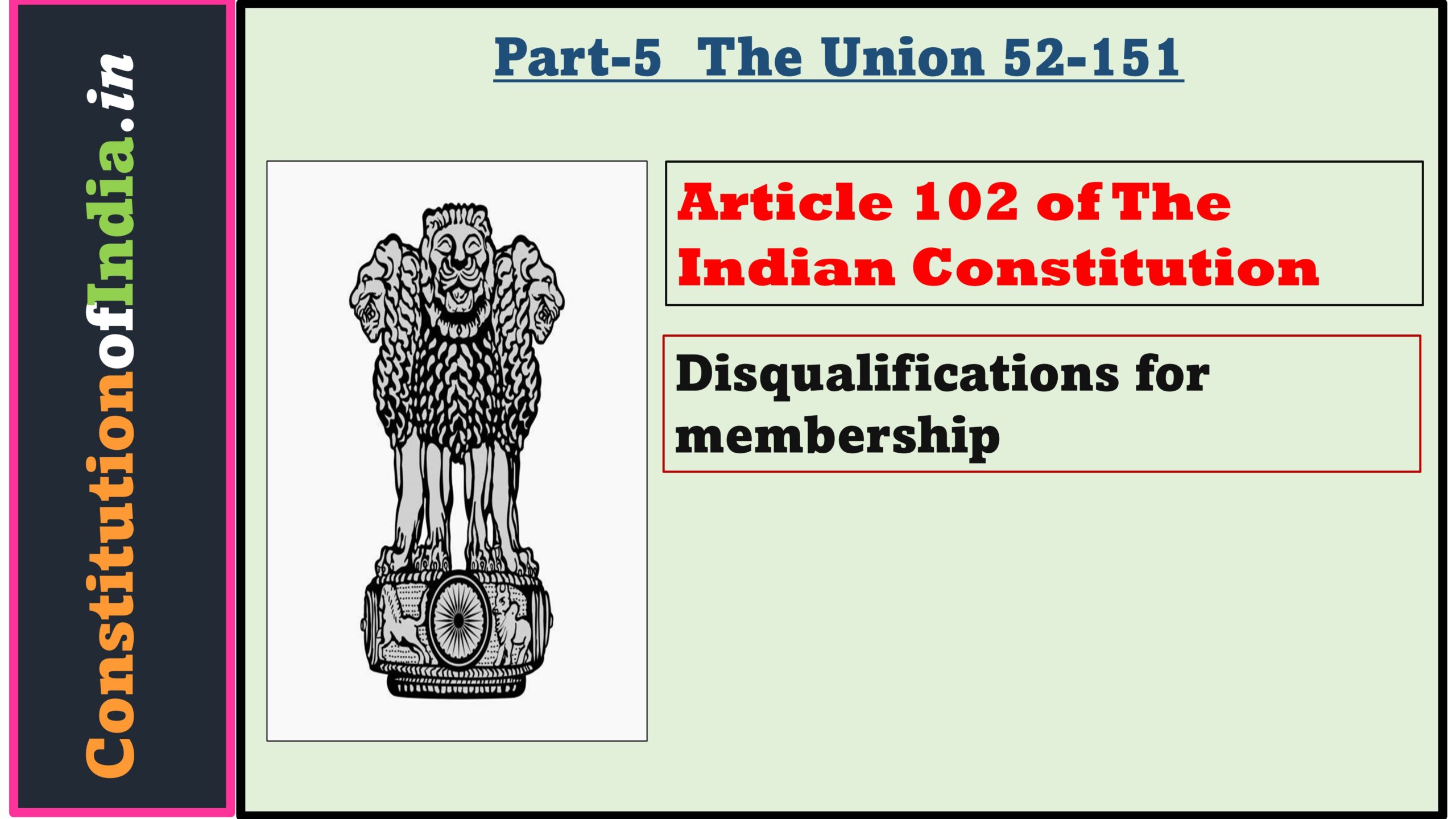Article 102 of Indian Constitution: Disqualifications for membership.

Article 102 – Constitution Of India
(1) A person shall be disqualified for being chosen as, and for being, a member of either House of Parliament—
(a) if he holds any office of profit under the Government of India or the Government of any State, other than an office declared by Parliament by law not to disqualify its holder; (b) if he is of unsound mind and stands so declared by a competent court;
(c) if he is an undischarged insolvent;
(d) if he is not a citizen of India, or has voluntarily acquired the citizenship of a foreign State, or is under any acknowledgment of allegiance or adherence to a foreign State;
(e) if he is so disqualified by or under any law made by Parliament.
Explanation.—For the purposes of this clause a person shall not be deemed to hold an office of profit under the Government of India or the Government of any State by reason only that he is a Minister either for the Union or for such State.
(2) A person shall be disqualified for being a member of either House of Parliament if he is so disqualified under the Tenth Schedule.
🏛️ Article 102 – Constitution of India
Title: Disqualifications for Membership of Parliament
🔹 Overview:
Article 102 lays down the grounds for disqualification of a person from becoming or continuing as a Member of Parliament (MP), covering both Lok Sabha and Rajya Sabha.
✅ Key Disqualification Criteria under Article 102(1):
1️⃣ Office of Profit:
A person is disqualified if they hold an office of profit under the Government of India or any State government, unless exempted by law.
📌 Note: Ministers are not considered to be holding an office of profit.
2️⃣ Unsound Mind:
Disqualification applies if a competent court has declared the person to be of unsound mind.
3️⃣ Undischarged Insolvent:
A person who is financially insolvent and not legally discharged is disqualified.
4️⃣ Citizenship Issues:
Disqualification occurs if the person:
- Is not an Indian citizen
- Has voluntarily taken foreign citizenship
- Owes allegiance to a foreign State
5️⃣ Disqualification by Law:
If Parliament enacts any law that disqualifies a person, such disqualification applies.
🔸 Article 102(2):
- A person is also disqualified if they are disqualified under the provisions of the Tenth Schedule (Anti-Defection Law).
📌 Summary Table:
| Clause | Grounds for Disqualification |
|---|---|
| (1)(a) | Holds an office of profit (except ministership) |
| (1)(b) | Declared of unsound mind by a competent court |
| (1)(c) | Undischarged insolvent |
| (1)(d) | Not a citizen of India or has foreign allegiance |
| (1)(e) | Disqualified under any law made by Parliament |
| (2) | Disqualified under the Tenth Schedule (Anti-defection provisions) |
🧠 Mnemonic to Remember:
“POIUD Law”
- P – Profit office
- O – Out of mind
- I – Insolvent
- U – Un-Indian (citizenship)
- D – Disqualified by law
- Law – Tenth Schedule law (Anti-defection)
❓FAQs on Article 102 – Disqualification of MPs
Q1. Can a minister be disqualified under the “office of profit” rule?
A. No, a person is not disqualified for holding the office of a Minister, as per the Explanation to Article 102(1). Being a Union or State Minister does not count as holding an office of profit.
Q2. What is the Tenth Schedule mentioned in Article 102(2)?
A. The Tenth Schedule of the Constitution, also known as the Anti-Defection Law, disqualifies MPs who defect from their political party, disobey party whips, or join another party after election without following due process.
Q3. Is foreign citizenship an automatic disqualification?
A. Yes. If a person voluntarily acquires foreign citizenship or acknowledges allegiance to a foreign State, they are automatically disqualified under Article 102(1)(d).